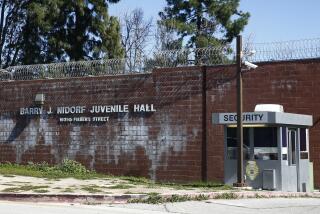AIDS: Slower Than Slow
- Share via
Strong support for public-health programs on AIDS has been expressed by most political leaders, but the commitments are not being backed up by adequate funds.
At the federal level, President Reagan’s Office of Management and Budget is considering providing part of the money for AIDS research by cutting Medicare funds. OMB wants to terminate reimbursements to doctors and hospitals for Medicare co-payments left unpaid by patients. This would take away about $200 million a year from these providers of basic health care to older Americans in order to fund the AIDS program, when clearly the providing of additional funds, not stealing from another already pinched program, is the way to go. On the other hand, the Social Security Administration will liberalize access to Medicaid programs on Sept. 1 for persons disabled by AIDS--a welcome reform.
At the state level, funding is far below recommended levels. A task force headed by Assemblyman John Vasconcellos (D-Santa Clara) had recommended $165 million for this year, but the Legislature cut this to $65.5 million and the governor reduced it to $63 million.
Los Angeles County, with the third-highest number of cases in the nation, has been particularly hard hit by cutbacks in state funding, which in some cases also reduce federal matching funds. The projected overall county AIDS budget had been increased. Some of the anticipated revenue will not now be forthcoming, however, because of the governor’s vetoes and because of delays by the state in seeking a waiver from the federal government to permit the use of Medi-Cal funds for alternatives to in-hospital care of AIDS patients. That Medi-Cal funding will not be available until next summer.
In an encouraging move, the governor’s staff is moving ahead with new regulations that will free Medi-Cal funds for hospice services to AIDS patients in the last six months of their lives. If that program can be put into place in the next few months, it would help the county establish a broader AIDS hospice program.
Efforts within Los Angeles County to create an AIDS hospice network to provide institutional and at-home care in terminal phases of the disease have been lagging. Two private programs are in the planning stage. A 36-bed facility in Hollywood is being undertaken under the auspices of Christopher Street West. The Roman Catholic Archdiocese, after a lengthy search for a site, is expected to complete plans in September for a seven-to-eight-bed facility. These are far short of the goals set by the unofficial AIDS Hospice Planning Commission, which called for 200 beds this year and 800 beds by 1991. Hospice care, both institutional and at the homes of AIDS patients, has proved to be more humanitarian and more cost-effective than hospitalization.
The inadequacy of funding raises serious questions about the ability of public-health agencies to prepare for the inevitable increase in the caseload. As of the end of July, the Centers for Disease Control have counted 39,263 AIDS cases in the United States, with 22,548 deaths. A recent study by RAND Corp. for the Health Care Finance Administration suggests that a cumulative total of 400,000 cases by 1991 should be considered a moderate estimate, while a more pessimistic analysis foresees 750,000 additional cases developing by 1991. On a world scale, estimates range from 5 million to 10 million cases at the present time, with the expectation that the number will increase in the next five years to at least 50 million.
Dr. Otis R. Bowen, the secretary of health and human services, has spoken with pride of the Reagan Administration’s commitment of $1.6 billion “in the six-year war that we have waged,” but the RAND study suggests that the cost of care alone over the next five years will exceed $37 billion, or about 1% of total health-care costs for that period. At least $10 billion of that would come from Medicaid, the joint federal-state program for low-income health care, according to the study.
An awareness of the problem has not been matched by innovative action to make programs more effective. San Francisco has demonstrated, with community-based programs, that the cost of care can be substantially reduced and at the same time made more humane for the recipients. That has also been confirmed in a state-sponsored study by AIDS Project Los Angeles, which delivered home care at less than $100 a day--compared to hospital costs of more than $900. But slowness by the state in seeking the federal waiver for alternative Medi-Cal programs has postponed for at least another year the full implementation of some of these innovations.
More to Read
Sign up for Essential California
The most important California stories and recommendations in your inbox every morning.
You may occasionally receive promotional content from the Los Angeles Times.










